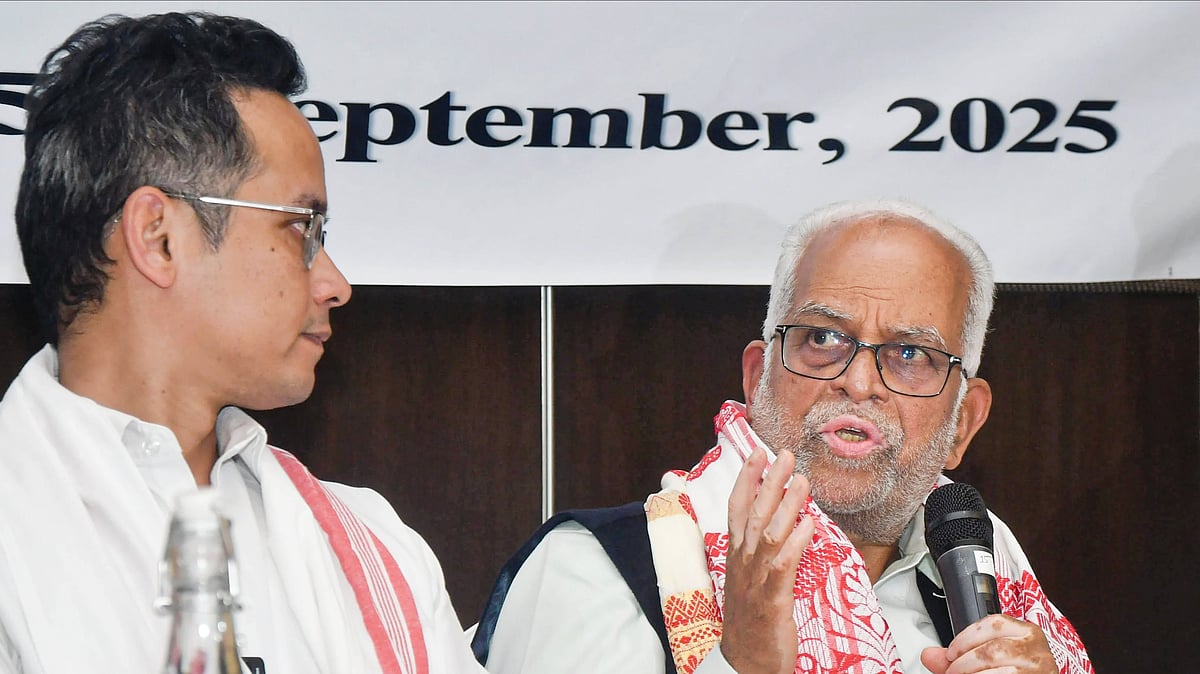POLITICS
Vice-president’s office not a political post: INDIA bloc's Sudershan Reddy
Former Gauhati High Court chief justice says role demands qualities similar to that of a judge — fairness, impartiality, reason

INDIA bloc vice-presidential candidate B. Sudershan Reddy on Friday said the office of the vice-president is a "high Constitutional body" and must be seen as distinct from day-to-day political institutions.
Speaking at a media interaction in Guwahati, the former chief justice of Gauhati High Court stressed that the role demands qualities similar to those of a judge — fair, impartial, and reasoned.
“It is not a simple political institution… The qualities required of a person who intends to sit in that office is akin to a judge — impartial, reasonable and fair in your words, actions and deeds… This is my understanding of the office of the vice-president,” Reddy was quoted as saying by the press.
Reddy, who has been fielded as the INDIA bloc’s consensus nominee for the vice-presidential election scheduled for 9 September, declined to comment on former vice-president Jagdeep Dhankhar’s abrupt resignation before the end of his term. He reiterated, however, that the vice-president's role is “not a simple political institution” but rather a dignified Constitutional responsibility.
During the interaction, Reddy also spoke about the role of the Election Commission of India (ECI), calling it a “Constitutionally empowered autonomous body” that plays a central role in ensuring free and fair elections. He, however, expressed concern over the changing relationship between the citizen and their right to vote.
“There is a saying that people of India first got the right to vote and then became citizens of the country, but now this has gone topsy-turvy,” he said, drawing from historical accounts of how India’s electoral framework was developed even before the Constitution was fully drafted.
Published: undefined
Reddy noted that the preparation of electoral rolls began as early as September 1947, and the principle of universal adult franchise was agreed upon in 1948. Despite ideological differences between Mahatma Gandhi and Dr B.R. Ambedkar, both leaders strongly supported the idea that every citizen should have the right to vote, he added.
“Therefore, I believe that there can be no predesigned map to exclude any individual or group of individuals in the name of caste, community, religion, creed or gender from participating in an election,” Reddy said.
He also highlighted that the electoral roll is the only document that makes no mention of caste, religion, or community, underscoring its neutrality.
Asked about the special intensive revision of electoral rolls, he refrained from commenting, citing that the matter is currently under discussion in the Supreme Court. “It will be imprudent on my part to make any comment on it,” he said.
Reddy further stated that the outcome of the vice-presidential election lies with the electoral college, which comprises members of both the Lok Sabha and Rajya Sabha. He pointed out that no party can issue a whip in this case, meaning MPs are free to vote as they choose.
“The response that I have got from the members of Parliament, media, civil society and intellectual community, writers, thinkers, outstanding personalities from the field of culture, I am sure of my win,” he said.
He added that within a day of his candidature being announced, several parties including the Aam Aadmi Party, as well as independents, had offered their unconditional support.
Reflecting on his return to Assam, Reddy said he was honoured to be back in the “land of Maa Kamakhya”, describing the state as his former karmabhoomi. He also noted the significance of arriving on the occasion of Teachers' Day, which he called an “auspicious moment”.
Published: undefined
Follow us on: Facebook, Twitter, Google News, Instagram
Join our official telegram channel (@nationalherald) and stay updated with the latest headlines
Published: undefined